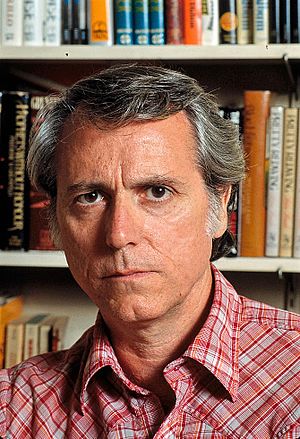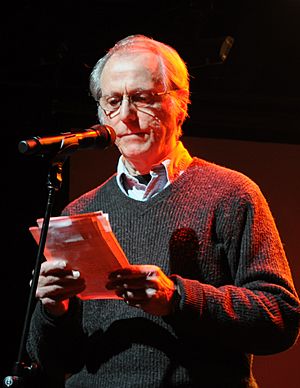Don DeLillo facts for kids
Quick facts for kids
Don DeLillo
|
|
|---|---|

DeLillo in 1988
|
|
| Born | Donald Richard DeLillo November 20, 1936 New York City, U.S. |
| Occupation | Novelist |
| Education | Fordham University (BA) |
| Period | 1960–present |
| Literary movement | Postmodernism |
| Notable works | The Names (1982) White Noise (1985) Libra (1988) Mao II (1991) Underworld (1997) The Angel Esmeralda (2011) |
| Signature | |
 |
|
Donald Richard DeLillo (born November 20, 1936) is a famous American writer. He is known for his novels, short stories, and plays. His work often explores big ideas about modern life. He writes about topics like shopping, technology, and major world events.
DeLillo became very well-known in 1985 with his book White Noise. This book won the National Book Award, a major prize for fiction. He also wrote Libra, a novel about the assassination of John F. Kennedy. Another famous book is Underworld, a long historical novel about America during the Cold War.
DeLillo has won many awards for his writing. He once said that writers should question the world around them. He believes it's important to write about power, big companies, and how people live.
Contents
Early Life and Finding a Passion
Don DeLillo was born in New York City. He grew up in an Italian-American neighborhood in the Bronx. In his home, his family spoke a mix of English and Italian. As a boy, he loved being outside and pretending to be a baseball announcer.
As a teenager, DeLillo wasn't very interested in writing. That changed when he got a summer job as a parking attendant. He had a lot of quiet time, so he started reading books. This new habit inspired him to become a writer. He loved authors like James Joyce, William Faulkner, and Ernest Hemingway.
DeLillo also found inspiration in other places. He enjoyed jazz music and movies from the 1960s and 1970s. He said that European films especially shaped how he thought about the world.
After graduating from Fordham University in 1958, he worked in advertising. He wrote ads for five years but decided it wasn't the job for him. He quit to focus on his own writing. His first short story was published in 1960.
A Career in Writing
First Novels in the 1970s
DeLillo was very productive in the 1970s, publishing six novels. His first novel, Americana, came out in 1971. It was about a TV programmer who goes on a road trip across America.
He quickly followed up with more books. These included End Zone, a dark comedy about college football and war. He also wrote Great Jones Street, a story about a famous rock star.
His fourth novel, Ratner's Star (1976), was a big and complex book. It's about a 14-year-old math genius who tries to understand a message from aliens. DeLillo said this was one of the hardest books for him to write. He ended the decade with two shorter novels, Players (1977) and Running Dog (1978).
Becoming Famous in the 1980s
In 1982, DeLillo published The Names. It's a thriller about a man who meets a strange group in the Middle East. But his biggest success came in 1985 with White Noise.
White Noise made DeLillo a literary star. The book is about a family dealing with modern fears, like environmental disasters and the constant noise of television. It won the National Book Award for Fiction. The book influenced many younger writers.
In 1988, he released Libra. This book is a fictional story about Lee Harvey Oswald, the man who assassinated President John F. Kennedy. To write it, DeLillo did a lot of research. The book was a bestseller but also caused some debate. Some people loved it, while others did not like how it mixed fiction with a real historical event.
Major Works of the 1990s
DeLillo's next novel was Mao II (1991). It explores themes of terrorism and how the media affects people's lives. The book was inspired by real-world events. It won the PEN/Faulkner Award, another important literary prize.
After Mao II, DeLillo spent several years working on his next big project. This became Underworld, published in 1997. It is a very long novel that tells the story of America from the 1950s to the 1990s.
Underworld begins with a famous baseball game in 1951. On the same day, the Soviet Union tested a powerful bomb. The book uses these two events to explore American history during the Cold War. Many critics called Underworld a masterpiece. It was nominated for the National Book Award and the Pulitzer Prize.
Later Novels and Recognition
After Underworld, DeLillo began writing shorter, more focused novels. In 2001, he published The Body Artist. This book is a quiet story about a woman dealing with loss.
His 2003 novel, Cosmopolis, follows a billionaire on a strange trip across New York City. In 2007, he wrote Falling Man, a novel about a family after the September 11th attacks in New York.
His more recent books include Point Omega (2010) and Zero K (2016). His latest novel, The Silence, was published in 2020. It imagines a world where all technology suddenly stops working.
Throughout his career, DeLillo has received many honors. In 2015, he was awarded the Medal for Distinguished Contribution to American Letters. His work continues to be studied and celebrated for its smart and challenging look at modern life.
Personal Life
Don DeLillo is a very private person. He does not often give interviews or make public appearances. He married Barbara Bennett, a landscape designer, in 1975. He lives in a suburb of New York City.
See also
 In Spanish: Don DeLillo para niños
In Spanish: Don DeLillo para niños
 | William Lucy |
 | Charles Hayes |
 | Cleveland Robinson |


